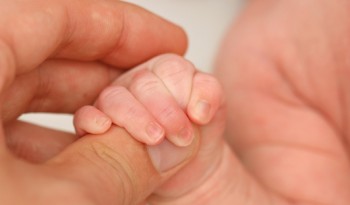
Severe combined immunodeficiency (SCID) is a rare but highly fatal condition that some babies are born with which prevents them from fighting off infection. One in 50,000-100,000 babies born have severe combined immunodeficiency disease. Their only hope for survival is a bone marrow transplant procedure, however, the disease is difficult to detect. While 31 states automatically test all newborns for severe combined immunodeficiency, and many more are planning to do so soon, Louisiana is one of the few that does not, even though the U.S. Department of Health and Human Services includes severe combined immunodeficiency on its list of 32 core conditions it recommends state health departments screen newborns for.
Early detection of the severe combined immunodeficiency disorder is crucial because babies who have it typically appear otherwise normal, and are initially able to stave off infection at first via their mother’s antibodies. Those who are treated within the first three months have a survival rate of 90 percent.
Although Louisiana briefly required testing between October of 2010 and April 2011 due to a legislative resolution, the funding ran out to continue the program, and unfortunately, the state department has not sought additional funding since. In addition, Louisiana does not even track the numbers of babies who die from severe combined immunodeficiency each year. In fact, it is easy to misinterpret cause of death as the specific infection that the baby contracted in the first place (such as pneumonia) due to having severe combined immunodeficiency.
Preventing severe combined immunodeficiency Medical Malpractice
There have been several cases whereby patients have presented doctors with the history and signs that their infants may suffer from SCID, only to have the doctor fail to diagnose the disease, and have the baby die. Although the state of Louisiana does not mandate that every newborn be tested, this does not mean that testing and proper medical care are not available to you if your family has a history of SCID.
If you have any relatives or ancestors who you know have suffered or died from severe combined immunodeficiency, it is crucial that any and all newborns in your family be tested immediately within the first three months of their lives. Knowing ahead of time what to expect, and ensuring that you conduct prenatal testing, can help steer families to the proper hospitals and specialists to help ensure that a baby survives. It is crucial that you know, in utero, what kind of care you will need, and screening is critical.
Those infants who have survived were typically placed in isolation in the hospital for at least three days, where they were cared for by people wearing masks, gloves, and scrubs so as to prevent introducing the infant to potential infection. These infants will also eventually need a bone marrow transplant, and, throughout their lives, regular intravenous globulin treatments to help boost their immune systems.
Louisiana Attorneys on Your Side
Harrell & Nowak have dealt with many medical malpractice (and failure to diagnose) cases. Our New Orleans legal team will fight to make sure that your medical bills are covered and that pain and suffering is compensated for. For more information about medical malpractice cases, such as the failure to diagnose a health problem or the delayed diagnosis of a health problem, be sure to contact our New Orleans, Louisiana personal injury lawyers today.
